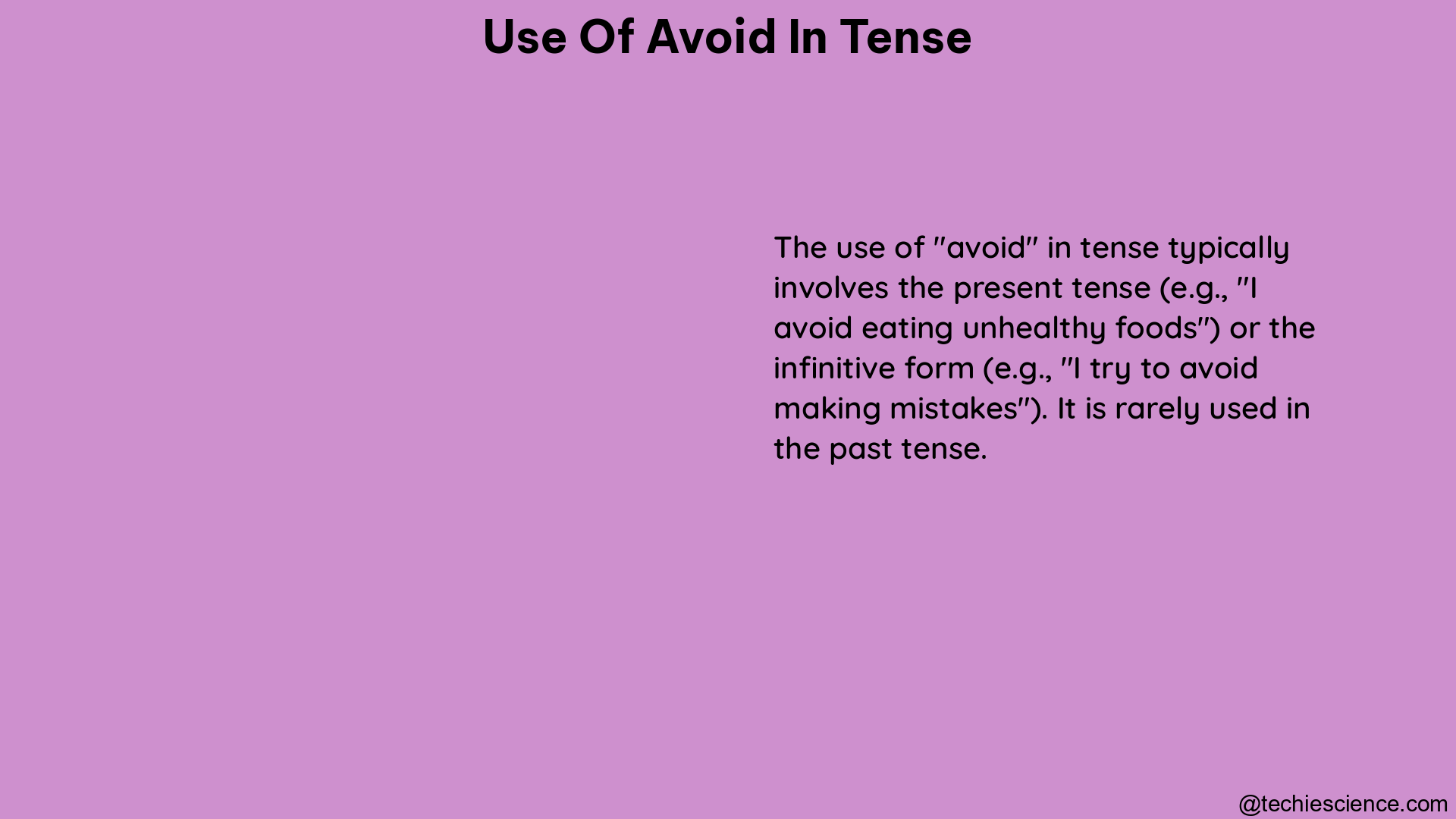The use of the verb “avoid” is crucial in English language, as it allows us to express the idea of intentionally steering clear of or preventing something from happening. Navigating the various tenses and conjugations of this verb can be a challenge for both native and non-native speakers. This comprehensive guide will delve into the intricate details of using “avoid” in different tenses, providing you with a thorough understanding and practical examples to enhance your English proficiency.
Present Tense
Simple Present
The simple present tense of “avoid” is used to express habitual or general actions. The conjugations are as follows:
- I avoid
- You avoid
- He/She/It avoids
- We avoid
- You avoid
- They avoid
Example: I avoid eating fast food as much as possible.
Present Continuous
The present continuous tense is used to describe an ongoing action or a temporary situation. The conjugations are:
- I am avoiding
- You are avoiding
- He/She/It is avoiding
- We are avoiding
- You are avoiding
- They are avoiding
Example: I am avoiding going to the mall this weekend due to the crowds.
Present Perfect
The present perfect tense is used to express an action that has been completed in the past but has relevance in the present. The conjugations are:
- I have avoided
- You have avoided
- He/She/It has avoided
- We have avoided
- You have avoided
- They have avoided
Example: I have avoided making that mistake again since the last time.
Present Perfect Continuous
The present perfect continuous tense is used to describe an action that began in the past and is still ongoing in the present. The conjugations are:
- I have been avoiding
- You have been avoiding
- He/She/It has been avoiding
- We have been avoiding
- You have been avoiding
- They have been avoiding
Example: I have been avoiding processed foods for the past few months to improve my health.
Past Tense

Past Simple
The past simple tense is used to describe a completed action in the past. The conjugations are:
- I avoided
- You avoided
- He/She/It avoided
- We avoided
- You avoided
- They avoided
Example: I avoided the party last night because I was feeling unwell.
Past Continuous
The past continuous tense is used to describe an ongoing action in the past. The conjugations are:
- I was avoiding
- You were avoiding
- He/She/It was avoiding
- We were avoiding
- You were avoiding
- They were avoiding
Example: I was avoiding eye contact with my boss during the meeting because I felt uncomfortable.
Past Perfect
The past perfect tense is used to describe an action that was completed before another past action or before a specific time in the past. The conjugations are:
- I had avoided
- You had avoided
- He/She/It had avoided
- We had avoided
- You had avoided
- They had avoided
Example: I had avoided the traffic by taking the back roads, but I still arrived late to the appointment.
Past Perfect Continuous
The past perfect continuous tense is used to describe an action that was ongoing before another past action or before a specific time in the past. The conjugations are:
- I had been avoiding
- You had been avoiding
- He/She/It had been avoiding
- We had been avoiding
- You had been avoiding
- They had been avoiding
Example: I had been avoiding the gym for weeks before finally deciding to go back.
Future Tense
Future Simple
The future simple tense is used to express a prediction or an intention about the future. The conjugations are:
- I will avoid
- You will avoid
- He/She/It will avoid
- We will avoid
- You will avoid
- They will avoid
Example: I will avoid making the same mistake again in the future.
Future Continuous
The future continuous tense is used to describe an ongoing action in the future. The conjugations are:
- I will be avoiding
- You will be avoiding
- He/She/It will be avoiding
- We will be avoiding
- You will be avoiding
- They will be avoiding
Example: I will be avoiding the city center this weekend due to the festival.
Future Perfect
The future perfect tense is used to describe an action that will be completed before another future action or before a specific time in the future. The conjugations are:
- I will have avoided
- You will have avoided
- He/She/It will have avoided
- We will have avoided
- You will have avoided
- They will have avoided
Example: By the end of the year, I will have avoided eating meat for a full 12 months.
Future Perfect Continuous
The future perfect continuous tense is used to describe an action that will be ongoing before another future action or before a specific time in the future. The conjugations are:
- I will have been avoiding
- You will have been avoiding
- He/She/It will have been avoiding
- We will have been avoiding
- You will have been avoiding
- They will have been avoiding
Example: By the time the new job starts, I will have been avoiding the long commute for several months.
Conditional Tense
Conditional Simple
The conditional simple tense is used to express a hypothetical or imagined situation. The conjugations are:
- I would avoid
- You would avoid
- He/She/It would avoid
- We would avoid
- You would avoid
- They would avoid
Example: I would avoid that restaurant if I were you, as I’ve heard the food is not very good.
Conditional Continuous
The conditional continuous tense is used to describe an ongoing hypothetical action. The conjugations are:
- I would be avoiding
- You would be avoiding
- He/She/It would be avoiding
- We would be avoiding
- You would be avoiding
- They would be avoiding
Example: If I had more time, I would be avoiding the crowds at the mall this weekend.
Conditional Perfect
The conditional perfect tense is used to describe a hypothetical action that would have been completed in the past. The conjugations are:
- I would have avoided
- You would have avoided
- He/She/It would have avoided
- We would have avoided
- You would have avoided
- They would have avoided
Example: If I had known about the traffic, I would have avoided taking the highway.
Conditional Perfect Continuous
The conditional perfect continuous tense is used to describe a hypothetical ongoing action that would have been in progress in the past. The conjugations are:
- I would have been avoiding
- You would have been avoiding
- He/She/It would have been avoiding
- We would have been avoiding
- You would have been avoiding
- They would have been avoiding
Example: If I had more free time, I would have been avoiding the stress of work for the past few weeks.
Imperative
Simple Imperative
The simple imperative form of “avoid” is used to give a direct command or instruction. The conjugation is:
- Avoid
Example: Avoid touching that hot surface to prevent burns.
Let’s Imperative
The “let’s” imperative form of “avoid” is used to make a suggestion or proposal. The conjugation is:
- Let’s avoid
Example: Let’s avoid going to the crowded restaurant tonight and try a quieter place instead.
By mastering the conjugations and usage of “avoid” in various tenses, you can effectively express a wide range of ideas and nuances in your English communication. This comprehensive guide has provided you with the necessary tools to confidently navigate the complexities of this versatile verb.
Reference:
- https://www.wordreference.com/conj/enverbs.aspx?v=avoid
- https://preply.com/en/question/past-tense-of-avoid
- https://www.gymglish.com/en/conjugation/english/verb/to_avoid

Hi…. I am Goutam Datta. I have completed a double M. A. in English and B. Ed. I am a creative writer. Currently, I am a part of the LambdaGeeks.